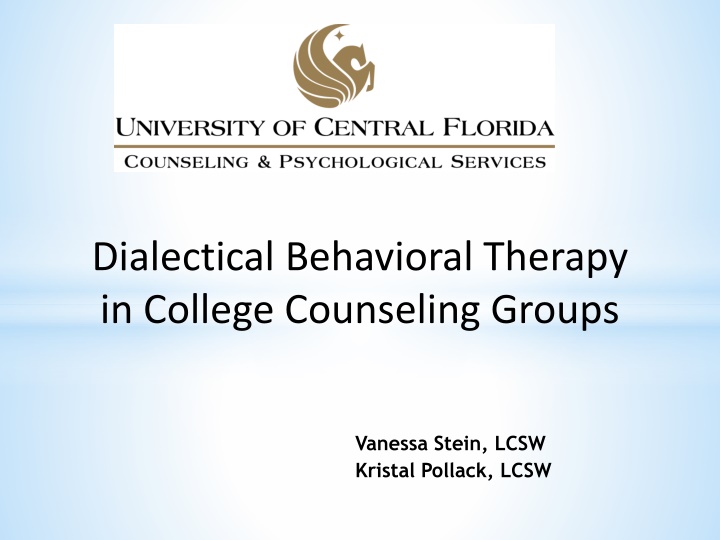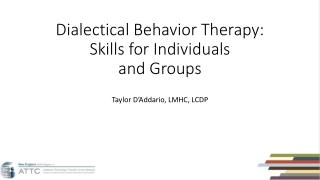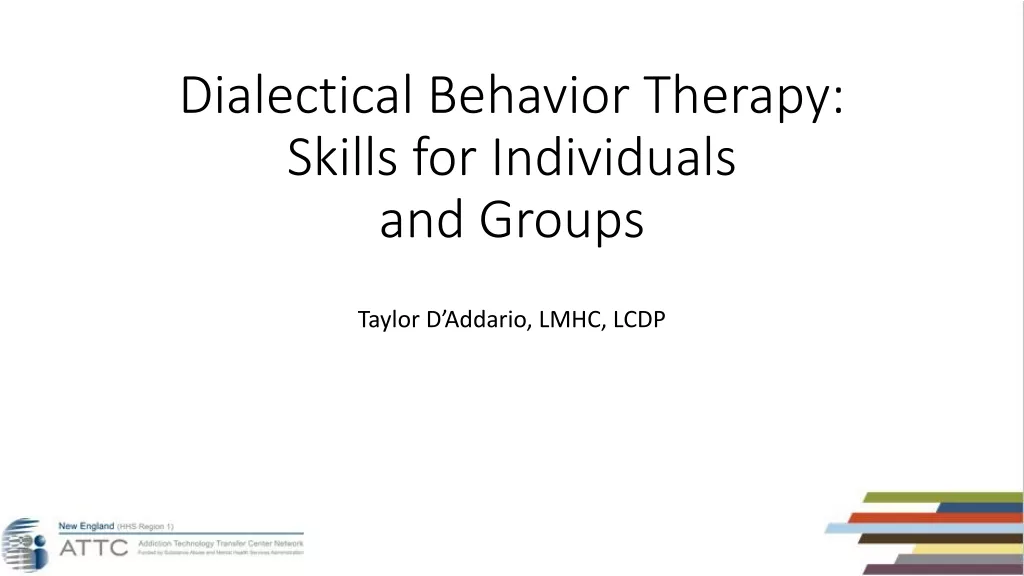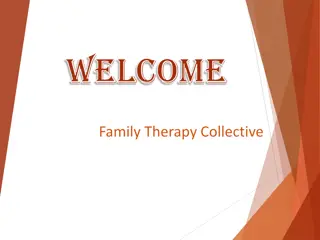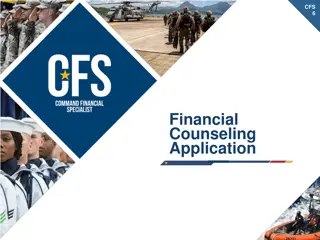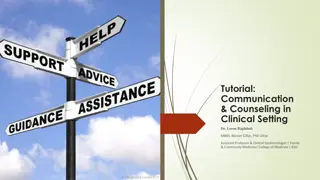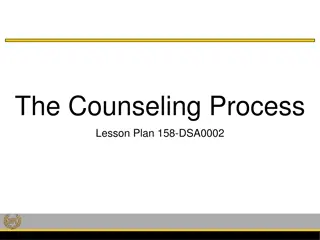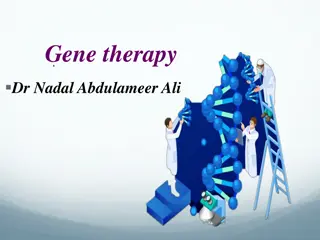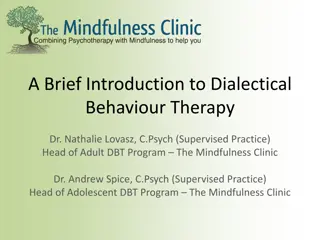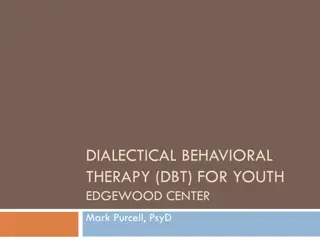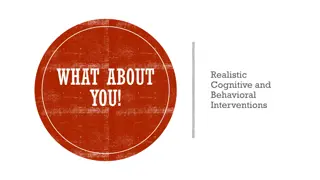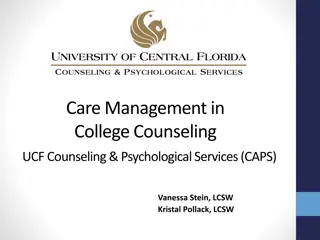Dialectical Behavioral Therapy in College Counseling Groups at UCF CAPS
UCF CAPS offers comprehensive psychological services for the UCF community, focusing on student-centered practices. The Care Management Team (CMT) provides wrap-around services to students, bridging campus departments and community resources. Three LCSWs serve as Care Managers, addressing various mental health and social issues. Through the CMT, students receive assistance on chronic mental health concerns, self-injury, substance use, financial stress, and more, ensuring integrated mental health care.
Download Presentation

Please find below an Image/Link to download the presentation.
The content on the website is provided AS IS for your information and personal use only. It may not be sold, licensed, or shared on other websites without obtaining consent from the author.If you encounter any issues during the download, it is possible that the publisher has removed the file from their server.
You are allowed to download the files provided on this website for personal or commercial use, subject to the condition that they are used lawfully. All files are the property of their respective owners.
The content on the website is provided AS IS for your information and personal use only. It may not be sold, licensed, or shared on other websites without obtaining consent from the author.
E N D
Presentation Transcript
Dialectical Behavioral Therapy in College Counseling Groups Vanessa Stein, LCSW Kristal Pollack, LCSW
*Presenter Information Kristal Pollack is a LCSW who graduated from FSU and FIU has been with CAPS since August 2013. Interests include depression, anxiety, non suicidal self injury, and crisis intervention. Past experiences include homeless shelter for youth, school social work, and community mental health. Campus liaison to Active Minds, and Nike and Hercules Resident Halls. Created and co-facilitates a DBT group for high risk students. Sits on the Eating Disorders Treatment Team. Vanessa Stein is a LCSW who graduated from UF and UCF and has been with CAPS since January 2013. She is a member of NASW and is a qualified Supervisor for the State of FL. Interests include anxiety, non suicidal self injury, grief & loss, crisis intervention and mindfulness. Past experiences in healthcare, hospice, and middle school settings. Campus liaison with VARC (Veterans) and Hillel (Jewish students). Awarded a grant to launch an innovative Peer Educators program. Created and co-facilitates a DBT group for high risk students. Sits on the Substance Abuse Treatment Team.
*Opposite Action http://www.youtube.com/watch?v=2MDReKsP3sQ
*Clinical Services at CAPS provides comprehensive psychological services to the UCF community. *We promote practices that are student centered and aspire to be seen as an essential resource to the UCF community. *In this effort, we offer a range of clinical services focusing on student s psychological and developmental needs. *We provide short term individual, couples and group counseling, workshops, campus presentations, crisis intervention, animal assisted therapy, expressive arts therapy, a peer educators program, yoga therapy and other innovative interventions *About UCF CAPS
The purpose of the Care Management Team (CMT) is to provide wrap-around services to students. This approach provides a valuable bridge between our internal departments on campus and other services in the community in an effort to provide UCF students with integrated mental health care. The CMT strives to serve the needs of our students and the University through efforts to coordinate case management, monitor referrals, promote coordination and monitoring of care through collaboration among departments or agencies, improve communication, and facilitate coordination and continuity of care in complex cases. *UCF Care Management Team
*CAPS has three full time Licensed Clinical Social Workers assigned as Care Managers *In 2013, CMT saw 207 students at 617 unique appointments *CMT assist students, who previously might have fallen through the cracks, with issues such as: *Chronic mental health concerns *Suicidal and homicidal thoughts *Non-suicidal self-injury *Substance use *Complex medical needs *Financial stress *Lack of insurance *Lack of basic essentials *Learning disabilities *Lack of motivation for change *Medication compliance *UCF Care Management Team
*Up until Spring 2014 CMT clients were only able to be seen for short term individual counseling for symptom stabilization and connection to community providers for long term counseling *Many CMT clients were not able to participate in group counseling *CMT therapists saw a need to address presenting issues and developed a Dialectical Behavioral Therapy group specifically for CMT clients *Treatment for Our High Risk/Complex Clients
Dialectical Behavior Therapy is a research-based, cognitive-behavioral treatment developed by Marsha Linehan at the University of Washington, to help clients with the suicidal and self-harm behaviors often seen in Borderline Personality Disorder. DBT has since then been modified as a treatment for other complex and challenging mental disorders that involve emotional dysregulation. Clients with these disorders often have great difficulty managing the emotional and relational crises of their lives because they lack the needed behavioral coping skills. Goals of skills training in DBT is to learn and refine skills in changing behaviors, emotional, and thinking patterns associated with problems that are causing distress. *What is DBT?
* Mindfulness- focuses on going within to find oneself and on learning to observe oneself. * Interpersonal Effectiveness-focuses on how to deal with conflict situations, to get what one wants and needs, and to say no to unwanted requests and demands. It focuses specifically on doing this in a manner that maintains self-respect and others liking and/or respect. * Emotion Regulation focuses on enhancing control of emotions, even though complete control cannot be achieved. * Distress tolerance- focuses on learning to tolerate distress. *Four Modules of DBT
*UCF CAPS held a workshop on DBT for three semesters *The workshop was a series of 4, one hour sessions, each focusing on a different module of DBT *Interventions were worksheet/handout based, as well as discussion of DBT *Attendance was low, as 1-2 clients participated each session *Previous Workshop
After evaluating the structure of the workshop, and assessing the need for a more therapeutic DBT group, it was decided to create the Finding Balance in Life group to address the needs of our high risk, complex clients. *Identified clients are screened for appropriateness *To assess continued risk for each client, they are given the Counseling Center Assessment of Psychological Symptoms (CCAPS) prior to each session. Any risk identified is assessed by group clinician(s) *To manage risk two clinicians run the group, as well as an additional 30 minutes added to group time (1.5 hours total) *Change in Structure
*12 sessions total * Group session 1 focused on Introduction to Group, consents, and overview of DBT *Group session 2 focused on Mindfulness *Group session 3-5 focused on interpersonal skills *Group session 6-8 focused on Emotion Regulation *Group Session 9-11 focused on Distress Tolerance *Group Session 12 focused on completion of group *Group Sessions
Behaviors to Decrease * Interpersonal Chaos * Intense/unstable relationships * Trouble maintaining relationships * Panic/Anxiety * Dread over relationships ending * Frantic efforts to avoid abandonment * Labile Affect * Extreme emotional sensitivity, ups and downs * Moodiness/intense emotional reactions * Chronic depression * Problems with anger (controlled/uncontrolled) * Impulsiveness * Alcohol, drugs, eating, spending , fast driving * Para-suicidal behaviors * Suicide threats * Confusion about self/Cognitive Dysregulation * Pervasive sense of emptiness * Problems in maintaining one s feelings, decisions, opinions when around others * Delusions, Depersonalizations, Disassociations *Goals of Group
Behaviors to Increase * Interpersonal Effectiveness * Learning how to deal with conflict * How to say no * How to be assertive * Emotional Regulation * Control of emotions * Understanding complete control may not be achieved * Distress Tolerance * Learning how to tolerate distress * Learning how to decrease impulsiveness * Reduce intolerable distress * Core Mindfulness * Go within to find oneself and observing oneself *Goals of Group
*Each client has to be in ongoing individual therapy *Clients who drop out of therapy are out of group *Clients are not to come to session under the influence of drugs and alcohol. *If another member reports to you in crisis you are mandated to report to CAPS or crisis hotline immediately *Information given in group is confidential *Clients who will be late or miss group must call *Clients may not form private relationships outside of groups *Pre-Set Rules of the Group
*Be respectful of everyone in group *Attempt to view everyone non-judgmentally *Let the group know if you need to leave for any reason *Clients may eat or drink in group and clean up after themselves *Client Identified Rules
*Feelings check in/CCAPS review *Mindfulness Activity *Teach Skill *Practice Skill *Review rating scale/diary card from previous week, and pass out for next week *Set goal for next week *Mindfulness Activity *Group Schedule
*Spring 2014 was first semester of DBT group *Four members CMT clients were original members *Two members dropped out of group without continued individual counseling *One member was added to group who was not CMT client *Although intermittent compliance and group inconsistency, CCAPS evidenced effective treatment intervention *First Semester
* Doctoral Intern at CAPS developed a procedure to evaluate the Finding Balance in Life group *Valid screening tools are administered intermittently throughout group (DASS- Depression Anxiety Stress Scale, DERS-Difficulties in Emotional Regulation Scale) *These are used in conjunction with qualitative evaluations *Evaluate data and determine treatment effectiveness *These screeners were not completed this semester, as we used CCAPS for program evaluation *Program Evaluation
*Is intended to meet the clinical, research, and administrative needs of the counseling center field *It is comprised of 7 subscales including: Depression, Generalized Anxiety, Social Anxiety, Academic Distress, Eating Concerns, Hostility, and Alcohol Use. *Measures Suicidal Ideations, Homicidal Ideations, and rates overall Distress *Severity indicators highlight distress, problematic areas, and possible diagnosis *Symptoms are highlighted in yellow for mild- moderate severity, and marked in red for severe distress *CCAPS
11/25/13 BASELINE 12/12/13 12/20/14 1/31/14 2/3/14 2/10/14 2/12/14 2/17/14 Subscale Depression 91 48 68 89 48 48 53 22 Generalized Anxiety 97 54 90 71 54 54 37 8 Social Anxiety 95 85 89 85 68 68 56 56 Academic Distress 83 36 22 29 16 49 49 29 Eating Concerns 89 71 76 71 65 71 65 39 Hostility 94 51 44 69 28 44 36 19 Alcohol Use 69 51 44 69 28 44 36 19 Overall Distress Distress Index 98 44 67 69 33 42 36 9 SI/HI 3/1 1/1 1/1 2/1 0/0 0/0 1/0 0/0 Client 1 Group Intervention Started
11/25/13 BASELINE 2/21/14 3/10/14 3/17/14 3/24/14 4/7/14 Subscale Depression 96 91 73 58 53 43 Generalized Anxiety 66 76 54 43 31 21 Social Anxiety 56 16 34 34 22 22 Academic Distress 93 93 77 70 63 57 Eating Concerns 39 85 85 71 76 71 Hostility 69 51 58 58 36 51 Alcohol Use 84 87 90 90 81 81 Overall Distress Distress Index 85 79 42 42 31 24 SI/HI 3/0 3/0 2/0 2/0 1/0 1/0 Client 2 Group Intervention Started
12/10/13 BASELINE 1/9/14 2/3/14 2/10/14 3/26/14 4/27/14 Subscale Depression 89 82 58 96 43 43 Generalized Anxiety 98 87 87 99 97 95 Social Anxiety 99 98 95 99 92 85 Academic Distress 93 83 93 97 63 63 Eating Concerns 39 39 49 71 65 57 Hostility 99 99 99 99 99 99 Alcohol Use 90 76 84 76 84 56 Overall Distress Distress Index 99 97 95 99 92 90 SI/HI 0/4 0/0 0/0 0/4 0/2 0/1 Client 3 Group Intervention Started
*Evidence of effectiveness in interventions *Simplicity of interventions *Level of openness from participants *Space for clients to discuss topics they normally do not discuss with others *Understanding having emotion is okay, and learning to manage these emotions effectively *Ability to see client multiple times per week and monitor risk *Strengths of Group
*Emotional instability and commitment of group members *High drop out rate *Low motivation of members *Resistance of members *Setting not appropriate for true DBT *Challenges of Group
* Each group member will have to sign contracts, identifying which modules will impact their life/why, and share with the group * If a member misses one group, the group as a whole will do a chain analysis as to why the member missed the group * If a member misses a second group the member will have to complete a chain analysis on their own, and present it to the group * If the client drops out of group they will be provided check ins until they are connected to community provider * As a group the last 30 minutes will be reviewing diary cards and setting goals * We will be recruiting members from all staff members and be offering case conferences to those clinicians 2 x a semester to assist in any issues coming up individually with diary cards, DBT techniques, etc. *Changes to Implement
